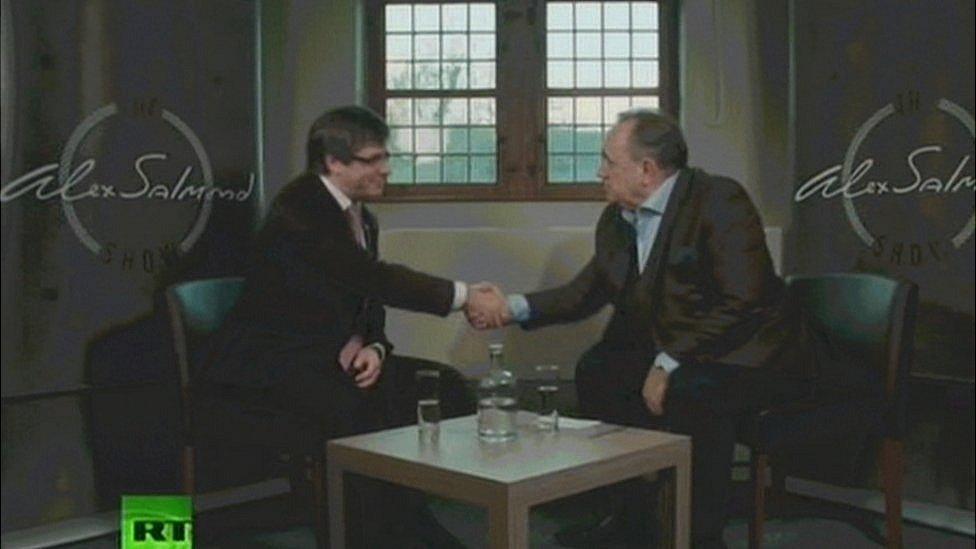FMQs: a day for deputies
- Published
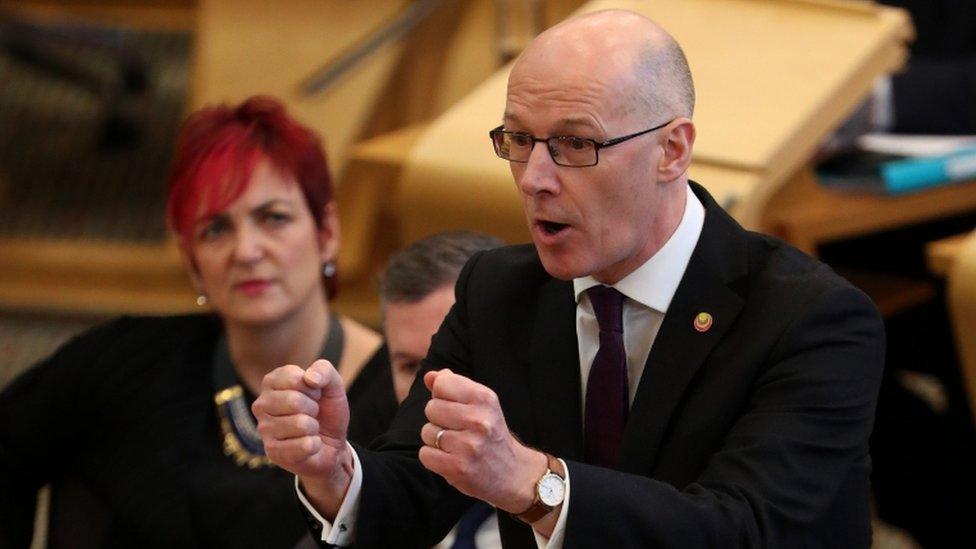
John Swinney stood in for Nicola Sturgeon at the weekly question session
It was, at least in part, a day for deputies. John Swinney performed his allotted constitutional role which is to stand in for the first minister when she is absent, on this occasion at climate talks in Bonn.
Actually, his true role is to lampoon the SNP's opponents and to utter stentorian declarations of Nationalist principle while sounding like a reassuring family doctor (one used to say "bank manager" but, post crash, they are figures of unalloyed terror).
The other deputising tribune was Labour's Jackie Baillie. But she now does it so regularly she is probably entitled to claim tenure, with associated benefits.
Ms Baillie is Labour's interim interim leader, standing in for Alex Rowley who stood aside in order to clear his name after claims were published in The Sun to the effect that he had sent abusive text messages to a former girlfriend.
Mr Rowley, who vigorously denies the claims, was himself only acting up in the top job, in place of the departed Kezia Dugdale.
(Q: is leading Scottish Labour still a top job? Answers should be in black ink. Please write on one side of the page only. Dictionaries may be used, as may histories of Scottish politics.)
And did les ingénues acquit themselves well? They did. Far better than Voltaire's original Child of Nature.
Because, of course, neither is remotely naïve or unprepared. Mr Swinney and Ms Baillie are amongst the most sagacious and sharp of the whole parliamentary tribe.
The deputy FM faced a toughie right at the outset. Ever so gently, Ruth Davidson of the Tories quoted from Mr Swinney's bound album of past speeches to the effect that those paying the basic rate of income tax deserved protection.
Equally gently, she reminded him that the SNP had promised to freeze the basic rate throughout the lifetime of this present Parliament, here assembled. What, she purred, had happened to those promises?
Now, had he but world enough and time, Mr Swinney might have embarked upon a lengthy discourse anent the theory and practice of democratic politics. He might have reminded Ms Davidson that the SNP promise was predicated upon a presumption of continuing majority government.
However, time pressed and perhaps the deputy FM calculated that the onlooking voters of Scotland would prefer to hear about their tax bills (he's good at sums, as a former finance secretary).
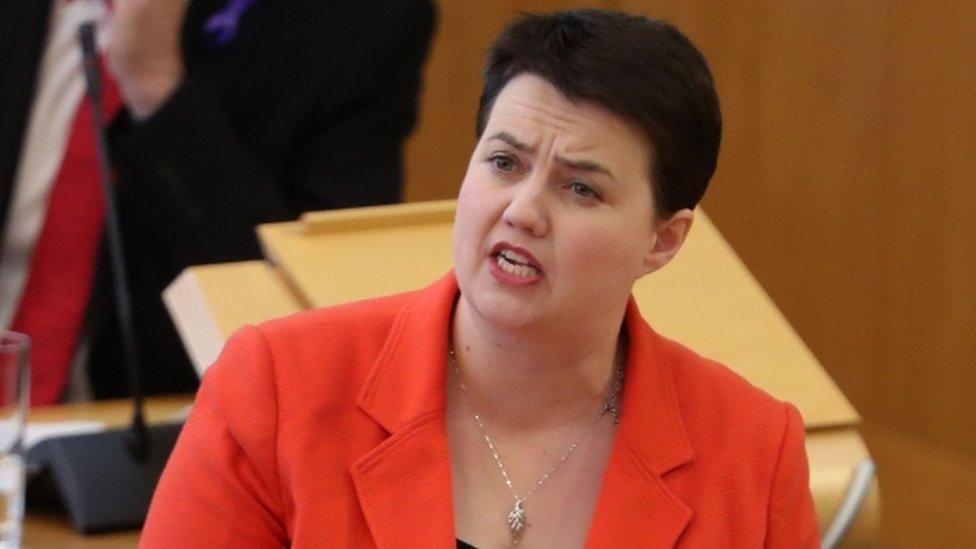
Ruth Davidson took Mr Swinney to task on the matter of tax
Either way, Mr Swinney can scent a potential problem in the making. Yes, political promises are subject to caveat and to the vagaries of electoral outcomes. But they tend to be delivered clean and sharp, with those caveats excluded.
Which is why Mr Swinney sounded sombre. Which is why his successor as finance secretary, Derek Mackay, is urgently engaged in talks with other parties, notably the Greens. Which is why the FM, Nicola Sturgeon, has expressed the need for caution on tax.
This is not, as she memorably noted, a game. This is about real money, earned by real people from real toil to fund real families.
Which is also why the Tories can scent a vote-winner for them, if they can remain moderate and relatively subdued.
However, Mr Swinney can fight back. And he duly did so, excoriating the impact of austerity as practised by the UK Government. He had himself - "this former finance secretary" - been obliged to mitigate UK policies in areas such as benefits.
Good exchanges, key subject. Huge battle to come.
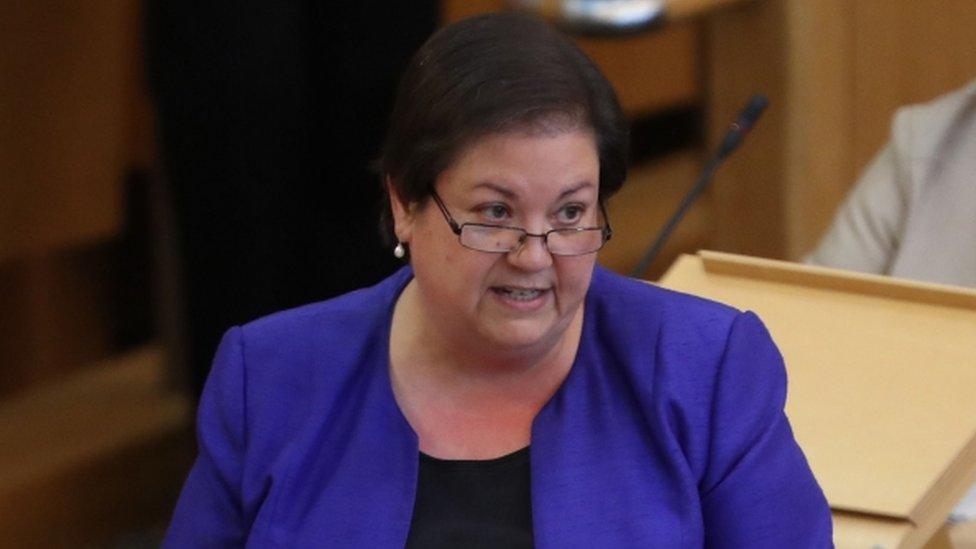
Jackie Baillie raised the future of the BiFab yards
Ms Baillie also chose an important topic. The future of the BiFab yards in Fife and Lewis, dogged by a contractual dispute.
This was a good choice for two reasons. One, it is of genuine importance, not just to the workforce in the yards but to Scotland's manufacturing and economic base.
And the second reason? It kept Ms Baillie on consensual ground, avoiding even the faintest possibility of provoking further attacks upon the presently enfeebled Labour Party.
The exchanges were detailed, thoughtful - but also elevating. All sides praised the workforce for their diligence and restraint which, Mr Swinney noted, had perhaps widened the window of opportunity for a rescue deal. All sides promised every possible assistance.
For the Greens, Patrick Harvie also raised BiFab, noting the company's significant role in broadening Scotland's base in green energy technology.
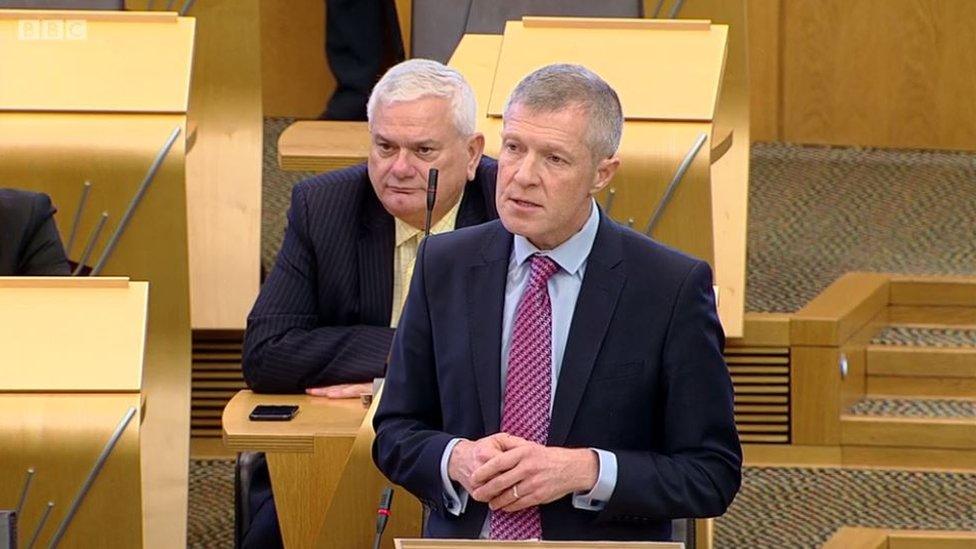
Willie Rennie voiced fears about Alex Salmond's new programme on RT
Then it was Willie Rennie's turn. He raised the topic of the Alex Salmond Show, which was broadcast for the first time this morning on RT, the Russia Today channel.
Watching from the gallery was the Estonian ambassador to the UK who had earlier advised a Holyrood committee that said channel was "a Kremlin arm of propaganda".
On the show itself, Mr Salmond, the former first minister and SNP leader, says he has full editorial control and advises folk to check out the content of his efforts before rushing to judgement.
Mr Rennie, he who leads the Scottish Liberal Democrats, was less than impressed. He asked whether the presenter of a talk show on RT would be a fit and proper person to own The Scotsman newspaper.
(Another of Mr Salmond's projects, since he was involuntarily retired by the voters of Gordon. More precisely, he is part of a possible bid project.)
'Reek of hypocrisy'
In vain did Mr Swinney remind the chamber that Mr Salmond was no longer an elected politician (something that, I feel sure, the subject himself feels keenly on a daily basis). RT may not be the first minister's channel of choice but Mr Salmond was his own boss on such matters.
Mr Rennie responded that it should "turn our stomach" that a former FM was giving "credibility and legitimacy" to this channel.
This was too much for Mr Swinney. Still without defending Mr Salmond (see above), he noted that Vince Cable, the Lib Dem federal leader, had also appeared on RT.
As Willie Rennie shouted "but he wasn't paid", Mr Swinney persisted. He detected the "stinking reek of hypocrisy" over the issue from other parties.
Alex Salmond. Still causing controversy without a seat either at Holyrood or Westminster. As the former FM was occasionally fond of quoting (from Burns), "the mair they talk, I'm kent the better."
- Published16 November 2017
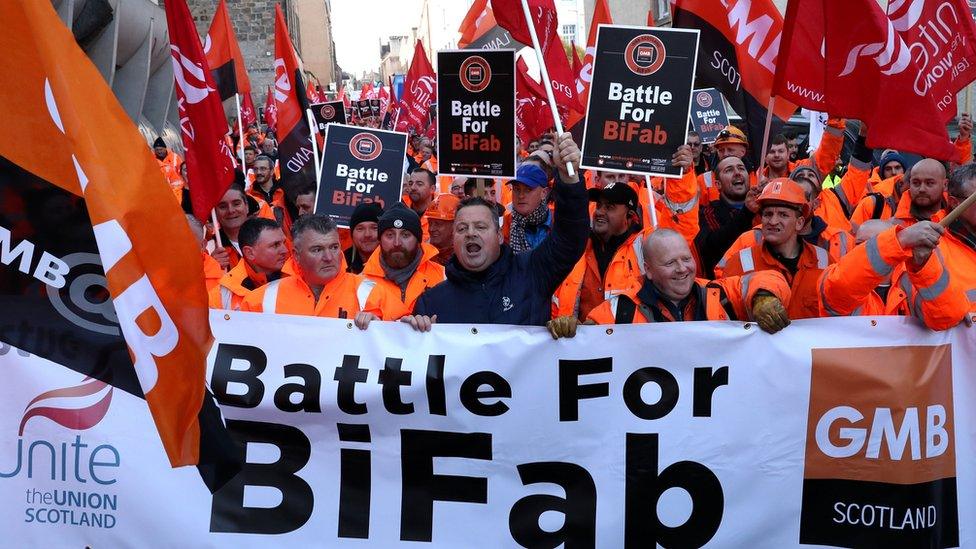
- Published16 November 2017
